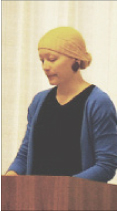On Tues., Feb. 20, the Louisville Axton Fellowship Reading Series welcomed rising experimental literary star Helen Philips to the University.
Phillips, who has published in such prestigious publications as “The L Magazine”, “The Brooklyn Review”, and “The Yale Literary Magazine,” read from her latest piece; a compilation novel composed of 175 stories. Each story is exactly 340 words.
“I wanted a constraint because constraint breeds creativity,” Phillips said of her stylistic writing. “The world is so chaotic it was nice to have something to hold on to; somewhere to start. Not to mention that 340 words is about how many words that you can fit onto a page if you use a narrow font.”
It is this unconventional “constraint” that has earned Phillips the classification of being an “experimental fiction” writer.
George Saunders, a leading experimental fiction writer and admitted role model for Phillips, defines the genre as “the art of telling a story in which certain aspects of reality have been exaggerated or distorted in such a way as to put the reader off the story and make him go watch a television show.”
“It is so wonderful to have such support, as this, for experimental literature,” said Phillips. “There tends to be such pressure to write only the traditional narrative.”
The unfamiliar format of the work can be quickly overlooked however as the stories are read. Phillips selected for the reading a section entitled “The Regimes,” that was composed of 12 stories taken from news stories she had read.
Despite the widely ranging subject matter in each story, the author clearly felt a strong attachment to the piece.
“I would call this an autobiography,” said Phillips. “I guess you could call it my memoir.”
The author’s view of the piece as an autobiographical one may be confusing to some, as there are no cohesive story lines, nor are there any succinct sets of characters present throughout the tale.
Instead of representing herself in the traditional format of a character driven story, Phillips worked to create a piece with a “flowing theme” that represented her thoughts and feelings.
Currently the piece remains unpublished although it has received a lot of attention and earned Phillips at least one award.
“I was always delighted with this project,” said Phillips. “I felt like I got to reinvent myself each day.”
The author has now turned her attention to the reading circuit and next plans to publish a young adult novel.






